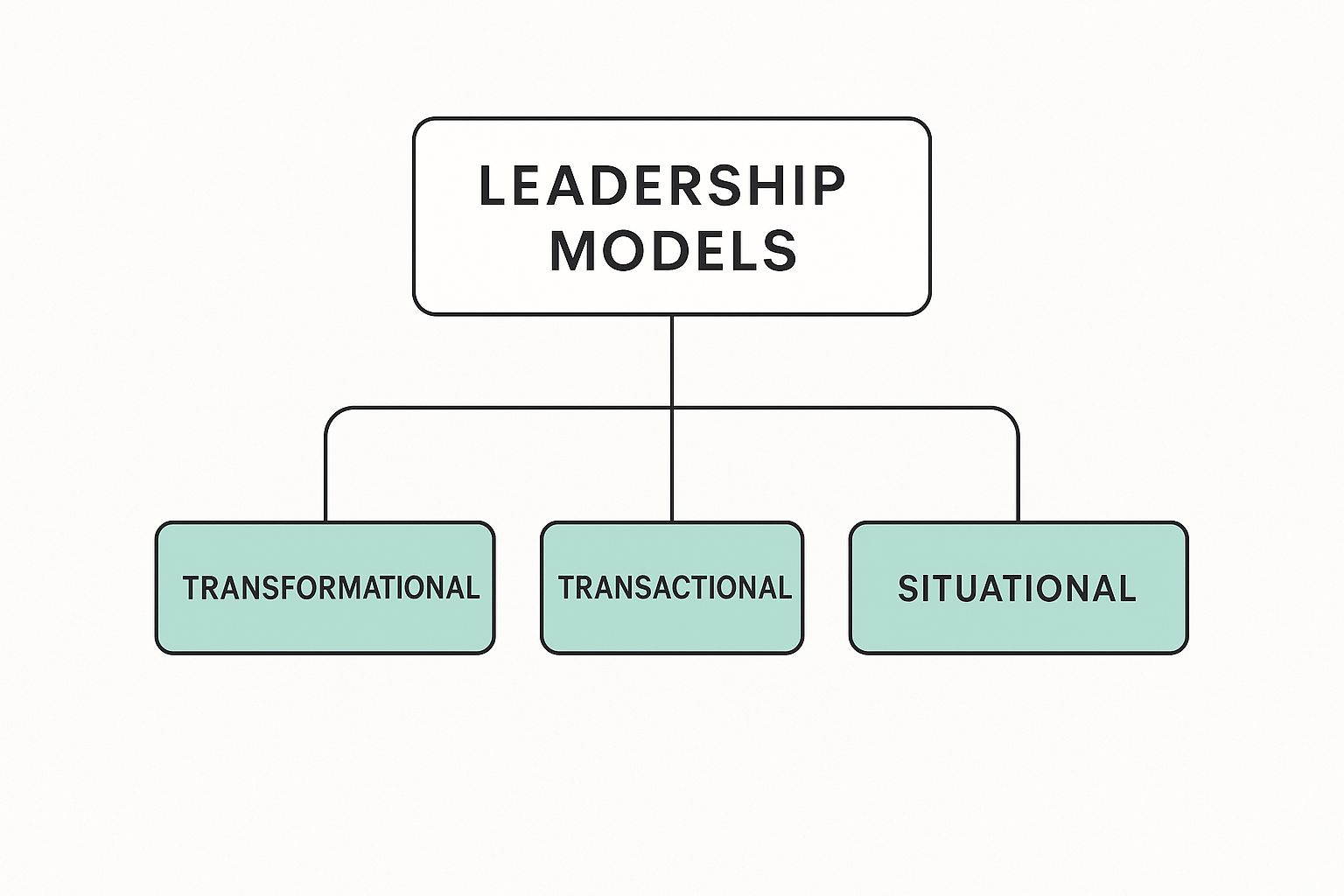
Are you a compassionate professional working in care, wondering how you can make an even bigger impact? Stepping into a leadership and management in health and social care role could be your next chapter. It's a career path that calls for vision, resilience, and a deep-seated commitment to improving people's lives.
But what does it really take to succeed? This guide will walk you through the day-to-day realities, the essential skills, and the training you need to become the kind of leader who inspires excellence and drives positive change.
Why Leadership in Health and Social Care Matters Now More Than Ever
Strong leadership has always been vital, but in today’s demanding climate, it’s absolutely essential. The sector is navigating a perfect storm of rising demand, workforce shortages, and ever-increasing public expectations. For anyone considering this career, it's crucial to understand the high-stakes environment you’d be stepping into. Our guide on how to get into health and social care is a great starting point for the initial steps.
Modern leadership in care has evolved far beyond managing spreadsheets and rotas. It's now about inspiring your team, finding creative solutions to tough problems, and building a culture where both staff and the people you support feel genuinely valued and heard.
The Human Element of Care Leadership
Beyond managing crises, the heart of leadership in this sector is profoundly human. It’s about people, not just policies and procedures. A truly successful leader in health and social care needs to be able to:
-
Inspire and Motivate: Great leaders lift team morale, celebrate small wins, and offer support when things get tough. A motivated workforce is the secret to high-quality, person-centred care.
-
Communicate with Empathy: You’ll be talking to a huge range of people—from staff and service users to their families and other agencies. The ability to listen and communicate with both clarity and compassion is non-negotiable.
-
Champion Ethical Practice: Leaders set the ethical tone for the whole organisation. This means making difficult decisions that always put the wellbeing and dignity of service users first.
-
Foster a Culture of Learning: Encouraging ongoing professional development and creating a safe space for staff to learn from mistakes is vital. It’s how you retain talented people and improve your service over time.
This career path isn't just another job; it’s a critical role in strengthening our communities. It gives you the chance to make a direct, positive difference in the lives of vulnerable people and the dedicated staff who support them. It’s a calling for those who want their work to genuinely matter.
A Day in the Life of a Care Leader

So, what does a leader in health and social care actually do? If you’re picturing someone stuck behind a desk all day, you couldn’t be further from the truth. The role is a dynamic mix of hands-on management, forward-thinking strategy, and real human connection. No two days are ever the same, which means you need to be just as comfortable with administrative duties as you are with showing genuine empathy.
A typical day rarely starts with staring at a screen. It starts with people. You might pull the team together for a morning huddle to set the day's priorities, go over any incidents from the last shift, and check in on who needs support. This is where your leadership really shines—setting a positive, organised tone from the get-go.
From that point on, it’s a constant balancing act between nitty-gritty operational tasks and bigger, long-term goals. Think of yourself as the conductor of an orchestra, making sure every section works in harmony to create a safe, effective, and compassionate environment for the people you support.
Juggling Operational Demands
A massive part of your day is simply keeping the service running like a well-oiled machine. This means diving into the details of daily operations, which can be incredibly varied and demanding.
These jobs are the backbone of your daily work, providing the stability and compliance that everything else is built on. A typical morning might see you tackling:
-
Managing Staff Rotas: This is far more than filling in a spreadsheet. You'll organise schedules for full cover, handle last-minute absences, and plan for future staffing needs. Getting this right is crucial for preventing team burnout and keeping care standards high.
-
Ensuring CQC Compliance: A top priority, always. You're constantly making sure every practice aligns with the Care Quality Commission (CQC) standards. This could involve reviewing care plans, checking medication records, or prepping for an inspection.
-
Overseeing Budgets: You'll need a careful hand on the purse strings, making smart decisions on spending for supplies, equipment, and staffing, all while delivering quality and value.
These tasks demand a methodical and organised mind. They are the non-negotiables that create a stable foundation for delivering truly excellent care.
Leading with Strategic Vision
As the day moves on, your focus often shifts from the immediate to the long-term. This is where leadership and management in health and social care really come together. You're not just keeping the service afloat; you're steering the ship towards a brighter future.
This strategic side of the job is where you drive real improvement and shape the culture of your service. It's about looking past today's to-do list to focus on growth, staff development, and building a resilient team.
A manager gets the rota right. A leader makes sure the right people are on the rota, feel valued in their roles, and are equipped to provide exceptional care.
This involves a different, but equally critical, set of activities. For instance, you might spend your afternoon:
-
Mentoring and Development: This could be a one-to-one with a team member who's showing potential or needs support. Investing this time builds a strong, skilled, and loyal team.
-
Collaborating with External Partners: A huge part of the role is working with others. You could be meeting a service user's family to update their care plan, liaising with local authorities about funding, or coordinating with GPs and other healthcare professionals.
-
Leading Change Initiatives: Perhaps you’ve spotted the need for a new digital care planning system or want to introduce a wellbeing programme for your staff. A leader’s job is to champion these ideas, get the team on board, and manage the change smoothly.
At the end of the day, being a care leader is a vibrant mix of problem-solving, planning, and nurturing people. You are the vital link between administrative tasks and the human side of care, ensuring every decision contributes to a thriving, compassionate, and high-quality service.
The Skills That Define Great Care Leaders
Becoming an effective leader in health and social care isn't about having one magic quality. It's about combining strong, technical abilities with powerful interpersonal skills. You need both to run a safe, compliant service and inspire your team to deliver exceptional, person-centred care.
In leadership and management in health and social care, this means mastering two distinct but equally crucial types of skills. One set keeps your service running smoothly and safely, while the other inspires your team to deliver the kind of care that makes a real difference.
Mastering the Hard Skills
Let’s start with the foundations. Hard skills are the technical, teachable abilities that form the operational backbone of any well-run care service. They’re concrete, measurable, and absolutely non-negotiable for delivering quality care.
Some of the most critical hard skills include:
-
Regulatory Compliance: A deep, practical understanding of the Care Quality Commission (CQC) frameworks and all relevant legislation. It’s what keeps your service safe, effective, and legally sound.
-
Financial Management: Smart budgeting, allocating resources for the most impact, and ensuring the long-term financial health of the service without compromising on care quality.
-
Performance Management: Setting clear goals for your team, monitoring progress, and using real data to drive improvements across every aspect of your service.
-
Strategic Planning: Looking ahead to develop long-term plans that align with your organisation's mission, anticipate the future needs of service users, and adapt to changes in the care sector.
Without these skills, even the most inspiring leader would struggle to keep their service afloat.
The Power of Soft Skills
If hard skills keep the service running, it’s the soft skills that make it truly thrive. These are the interpersonal qualities that shape how you interact with your team, motivate them, and build a positive, supportive culture where everyone feels valued.
"A manager focuses on systems and processes. A leader focuses on people and potential. In care, you must be both."
The pressures on the health and social care sector are enormous. Staff burnout is a critical issue that directly impacts the quality of care people receive. A recent study revealed that over 35% of Brits have noticed a decline in care quality for themselves or a family member, a problem directly linked to exhausted staff and stretched resources. This is where your soft skills become your most powerful tool for building resilience.
Key soft skills every care leader needs are:
-
Empathy and Compassion: The ability to genuinely connect with and understand the feelings of both the people you support and the staff you lead.
-
Clear Communication: Being an active listener as much as articulating your vision. It's about adapting your style whether you're talking to a care assistant, a family member, or a commissioner.
-
Ethical Decision-Making: Consistently making decisions that are fair, just, and always in the best interests of the people in your care.
-
Inspirational Leadership: Motivating people to go the extra mile because they believe in a shared purpose and are led by your positive example.
This diagram helps to visualise how different leadership models can be applied in various situations, each one drawing on a unique mix of these hard and soft skills.

The best leaders are flexible, able to shift their approach based on the challenge at hand. This table breaks down the distinct—yet complementary—roles of management and leadership within a care setting.
Management Tasks vs Leadership Qualities in Care Settings
|
Focus Area |
Management Task (Maintaining Stability) |
Leadership Quality (Driving Excellence) |
|---|---|---|
|
People |
Organising staff rotas and delegating tasks. |
Inspiring and motivating the team towards a shared vision. |
|
Operations |
Ensuring compliance with CQC regulations. |
Fostering a culture of continuous improvement and innovation. |
|
Resources |
Managing budgets and ordering supplies. |
Strategically investing in staff development and training. |
|
Problem-Solving |
Resolving immediate operational issues. |
Anticipating future challenges and planning proactively. |
|
Communication |
Disseminating information and holding team meetings. |
Actively listening to staff and service user feedback. |
Ultimately, a great care leader understands that they must be both a proficient manager and an inspiring leader. They use their hard skills to create a stable, safe environment and their soft skills to build a culture of excellence and compassion within it.
A vital skill for any care leader is gathering feedback to ensure services meet needs; this includes learning about effective customer feedback strategies. For a deeper dive, read our article on the top three qualities every good manager needs.
Shaping the Future of Care with Strategic Vision

The best leaders in health and social care don’t just put out today’s fires; they design a better tomorrow. Their role is far more than day-to-day management. It’s about having the strategic vision to build a care system that's more resilient, effective, and sustainable for the years ahead.
This means moving away from a model that only reacts to crises towards one that prevents them from happening. A forward-thinking leader champions this change, steering their service towards proactive, community-focused care that helps people stay healthy and independent for longer.
The Shift Towards Proactive and Preventative Care
For a long time, the traditional model of care has been reactive, stepping in to treat illnesses only after they’ve become serious. Modern leadership recognises this isn't sustainable or what’s best for people. The future is all about prevention and early intervention.
A strategic vision for leadership and management in health and social care involves a laser focus on community-based support that tackles health issues before they escalate. This could be anything from promoting healthy lifestyles to using data to spot who is most at risk.
To make this happen, you need to build rock-solid partnerships with local authorities, GPs, and community organisations to create a truly joined-up network of support. It’s about creating a system that wraps around the individual, rather than making them navigate a maze of disconnected services.
The most powerful interventions are often the ones that happen before a crisis. A leader's vision is to make exceptional care not just a reaction, but a constant, proactive presence in the community.
This strategic pivot isn't just an idea; it's already happening. There's a major reform ambition in the UK to build long-term sustainability through preventative care. Today, a significant portion of healthcare spending is now dedicated to prevention and public health, a shift that is helping to improve outcomes and manage system costs.
Integrating Technology to Drive Efficiency
A huge piece of the puzzle in shaping future care is embracing technology. Visionary leaders know that digital tools aren't just trendy add-ons; they're essential for working more efficiently, communicating better, and delivering more personalised care.
A strategic vision for care leadership often involves bringing in new tech, like using digital check-in systems in healthcare facilities to improve patient flow and cut admin. But the potential goes so much further.
Key technologies being adopted include:
-
Digital Care Planning: Moving from paper records to dynamic digital plans that can be updated in real-time and shared securely between professionals.
-
Virtual Wards and Remote Monitoring: Using technology to monitor people's health in their own homes, empowering them while freeing up hospital beds.
-
AI-Powered Diagnostics: Adopting tools that can help with the early diagnosis of conditions, leading to quicker intervention and better health outcomes.
-
Data Analytics: Using data to spot trends, predict future demand, and decide where to allocate resources most effectively.
By weaving these tools into your services, you can boost the quality of care and make your organisation more efficient and financially stable. This technological foresight is a hallmark of modern leadership.
Your Pathway to a Fulfilling Leadership Career

Are you an experienced care professional feeling that pull to step up and make an even bigger difference? Moving from a hands-on role into leadership is a deeply rewarding path, but it takes more than your existing practical skills. It demands a new focus on strategy, operations, and, most importantly, inspiring others.
This is where formal training comes in. A dedicated qualification is the bridge that connects your invaluable on-the-ground knowledge with the credible, recognised expertise employers are looking for. It gives you a solid framework and the confidence to lead a team effectively and truly shape the quality of care.
The Best Qualification to Become a Care Leader
For anyone aiming for a leadership position in adult care, the right qualification is a powerful statement about your competence and your ambition.
The TQUK Level 5 Diploma in Leadership and Management for Adult Care (RQF) is the brilliant course you need to move into this line of work. It is specifically designed to give you the exact skills you'll need to excel in management. This regulated qualification is respected across the sector because it’s built on the core pillars of what makes a great leader.
By completing this diploma, you're sending a clear signal to employers: you're ready to manage, lead, and drive positive change. It gives you the theory to back up your hands-on experience, covering crucial areas like:
-
Leading and managing person-centred care practices.
-
Overseeing governance, quality assurance, and regulatory compliance.
-
Developing professional supervision and performance management systems.
-
Managing resources and fostering a positive, supportive work culture.
The Benefits of Studying Online with Stonebridge
Investing in this qualification brings tangible benefits that can fast-track your career. It's a direct route to greater responsibility, more influence, and higher earning potential.
A qualification like the Level 5 Diploma doesn't just teach you how to manage a service; it empowers you to lead with confidence, credibility, and a clear vision for excellence.
The key advantages of gaining this regulated (RQF) qualification are clear:
-
Enhanced Credibility: An RQF qualification is nationally recognised, proving you meet a high standard. This immediately builds trust with employers and your team.
-
Career Advancement: It directly prepares you for roles like Registered Manager or Deputy Manager, making you a standout candidate for promotion.
-
Increased Earning Potential: With greater responsibility comes the opportunity for a better salary that reflects your new level of expertise.
-
Improved Confidence: Gaining a deep understanding of leadership principles gives you the self-assurance to handle complex challenges.
For many, a leadership diploma is the first major step towards higher-level roles and can even be a stepping stone to further study. If you're thinking about university down the line, understanding what an Access to Higher Education course involves can also be helpful.
Why Choose Stonebridge for Your Leadership Training?
Choosing the right qualification is a huge step, but picking the right training provider is just as important. The way you learn, especially when you're juggling a demanding career in care, can make all the difference. This is where Stonebridge Associated Colleges comes in, offering a refreshingly flexible approach built for your life.
We get it. You have professional and personal commitments that can’t just be put on pause. That’s why our TQUK Level 5 Diploma in Leadership and Management for Adult Care (RQF) is delivered online. This gives you the freedom to study whenever and wherever suits you best—whether that’s after a long shift, on your day off, or during a quiet moment at home.
A Flexible Way to Fund Your Future
We believe education should be accessible. That’s why Stonebridge offers a flexible, subscription-based way to pay for your course. Instead of large upfront fees or long-term credit agreements, you simply pay an affordable monthly fee. Plus, you can start on a seven day free trial!
Our goal is to make career-boosting education accessible to everyone. You pay a simple monthly fee, and you can pause or cancel your subscription at any time. No hidden costs, no long-term debt—just total control over your learning journey.
This fresh approach puts you firmly in the driver's seat. It means you can invest in your professional development without financial pressure, making high-quality leadership training more attainable than ever. This is a key part of our commitment to flexible leadership and management in health and social care education.
This system gives you:
-
Affordability: Low monthly payments spread the cost, making it easy to budget.
-
Flexibility: Life is unpredictable. You have the freedom to pause your studies and payments if your circumstances change.
-
Control: There are no long-term credit agreements. You are in complete control of your subscription.
Personalised Support Every Step of the Way
With over twenty years of experience helping learners achieve their goals, we’ve perfected a supportive online environment that combines the flexibility you need with the expert guidance you deserve. Choosing Stonebridge means choosing a partner dedicated to helping you succeed on your terms.
Common Questions About Care Leadership Roles
Thinking about stepping into a leadership role is a huge decision, and it’s natural to have questions. To help you get a clearer picture, we’ve put together some of the most common queries we hear from aspiring leaders in health and social care.
Here are the straightforward answers you need to understand what the job involves and what it takes to succeed.
Do I Need Previous Management Experience?
Not necessarily. While having a background as a senior carer or in a supervisory role is a definite advantage, it’s not always a strict requirement. Plenty of experienced care professionals make the leap into management successfully.
This is exactly what qualifications like the TQUK Level 5 Diploma are for. They take your practical, hands-on knowledge and add the formal leadership and management skills you need, helping you transition into a new role with confidence.
What Are the Biggest Challenges for New Care Managers?
Most new managers find that staff management is their biggest learning curve. This covers everything from recruiting the right people and retaining your best team members to dealing with the very real problem of staff burnout. You'll also need to get good at delegating and making that mental shift from being a colleague to being a leader.
Other key challenges include:
-
Getting to grips with the complexities of CQC regulations and inspections.
-
Juggling tight budgets to deliver top-quality care.
-
Building great relationships with service users, their families, and other professionals.
Being a successful new leader isn't about having all the answers on day one. It’s about being ready to learn, adapt, and lead with empathy, especially when facing tough operational pressures.
How Does a Leadership Qualification Improve Care Quality?
A formal qualification gives you a toolkit of proven, effective strategies to make a real difference. It teaches you how to properly implement person-centred care, manage your team in a way that gets the best from them, and build a positive culture where both staff and service users feel valued.
This has a direct impact on the quality of care. A well-led, motivated team means lower staff turnover and better morale, which naturally leads to more consistent and compassionate support for the people you care for. You also learn how to manage quality assurance systems, ensuring every part of your service is safe, effective, and always improving.
Is an Online Qualification as Valuable as a Traditional One?
Yes, absolutely. What employers really care about is the qualification itself and the skills it proves you have. The TQUK Level 5 Diploma is a nationally recognised qualification on the Regulated Qualifications Framework (RQF), which means it has met strict, high-quality government standards.
Earning it online also says a lot about you. It shows you’ve got strong self-discipline, great time management, and a genuine commitment to your professional growth—all fantastic leadership qualities that will make you a much more appealing candidate.
Ready to take the next step in your career and become the leader your care team deserves? At Stonebridge Associated Colleges, we provide the flexible, supportive training you need to succeed.
Learn more about the TQUK Level 5 Diploma in Leadership and Management for Adult Care (RQF) and start your journey today with our affordable subscription plan.




